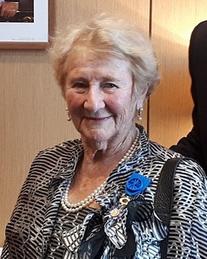Canadian author Antonine Maillet, "who shaped a new literary language for an isolated French-speaking minority, becoming the first non-European to win France's most prestigious literary prize," died February 17, the New York Times reported. She was 95. In novels, short stories, and plays, Maillet "gave voice to the overlooked French-speaking populations in the historic region of Acadia--perhaps half a million people spread across the Anglophone Maritime Provinces of Canada."
 |
|
| Antonine Maillet | |
"We Acadians, we were considered inferior beings," she told Le Monde in 1979 after winning the Prix Goncourt for her novel Pélagie-la-Charrette, one of her few works to be translated into English (Pélagie, 1982). "I was perfectly aware that if I wanted to succeed in life, I had to become English-speaking, because the Acadian was looked down on for what he was."
Maillet created a new language out of the archaic French that had survived through an almost exclusively oral tradition in her native Acadia. "I speak for those who couldn't, because they didn't know how to write," she once said in an interview.
"She invented Acadia, gave their laurels to a people that had been forgotten and whose survival was due only to incredible obstinacy," critic Gerard Meudal wrote in Le Monde in 1997. "She made their voices heard."
A theme park, animated by principal characters from her works, was built in 1992 in Bouctouche, New Brunswick, Maillet's hometown. A Canada Post stamp with her image was issued in 2021. President Emmanuel Macron of France awarded her the Légion d'Honneur the same year, and visited her at her home in Montreal in 2024.
"She gave back to the French language a note that was no longer being heard, the French of Rabelais," Pierre Filion, her longtime editor at Leméac, said in an interview. "And cultivated French people appreciated it."
Maillet published her first novel, Pointe-aux-Coques, in 1958 and her second, On a Mangé la Dune, in 1962. She taught literature during the 1960s and early 1970s at the Universities of Moncton, Laval, and Montreal, and earned her Ph.D. at Laval in 1971. By the mid-1970s, her literary success, notably with La Sagouine and Mariaagélas, allowed her to devote herself to writing.
"We are a minority, even on our home turf," she told Le Monde in 1979. "Which is even harder than being in a minority abroad. And this is what I want to say: All those who are, in this world, a little bit mistreated, looked-down on, in the minority--we understand them."

